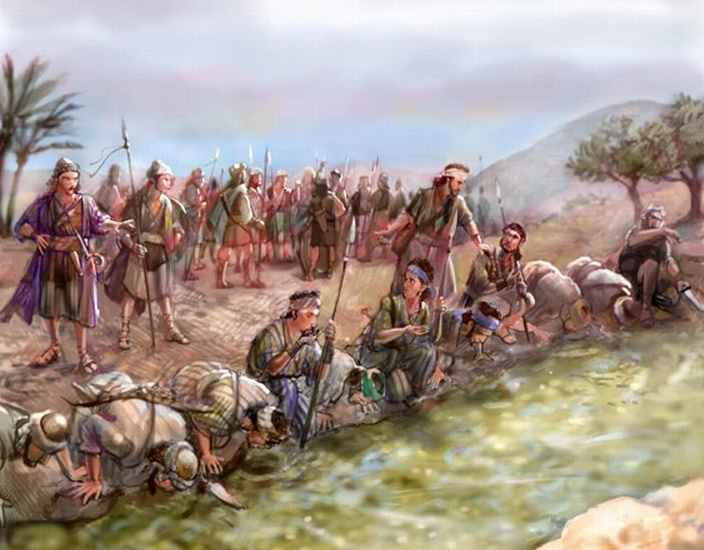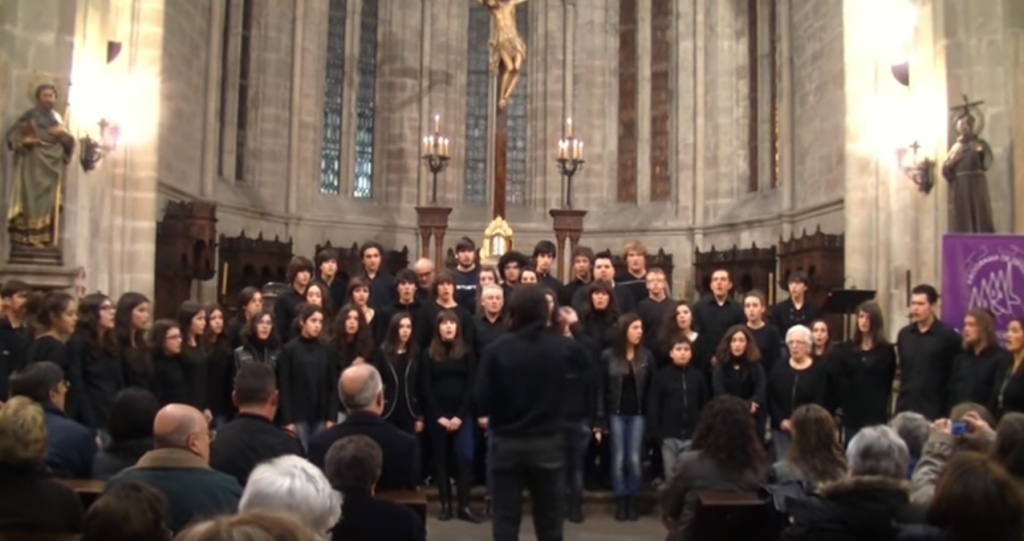 Editor’s note: The following is extracted from Sermons, by Rev. William G. Neville (published 1908).
Editor’s note: The following is extracted from Sermons, by Rev. William G. Neville (published 1908).
“Not by might, nor by power, but by my Spirit, saith the Lord of hosts.” — Zech. iv. 6.
The immediate reference of this text is to the rebuilding of the temple. The people had been carried captives to Babylon. While they were away their sacred edifices had been destroyed by the enemy. Upon their return from captivity, under the leadership of Zerubbabel, they determine to rebuild the temple. But they are few and weak; and their resources are scant and limited. Under these adverse and discouraging circumstances, God comes to them with words of cheer and encouragement. “Not by human might, nor human power; but by the might and power of God’s Holy Spirit.”
But the truth contained in the text has a much wider application than to the context. This truth applies to all church work, and to all individual Christian work in the church.
In order to illustrate and enforce this truth, I desire to use the incident of Gideon and his three hundred against the Midianites as recorded in the sixth and seventh chapters of Judges.
Great hordes of Midianites had invaded the land; they had pillaged the country and had subdued the people. The Israelites were discouraged and almost ready to give up in despair — they were so few and weak in comparison with their enemies. But God had before them a great history and a magnificent destiny. So he calls Gideon to the work of subduing the Midianites. God, in his providence, had prepared the work for him, and then he calls him to the work.
So God calls men oftentimes to a special work, not by an audible voice every time, of course. God works by secret operations and internal influences to bring to pass his plans and purposes. “Like Cincinnatus at his farm, and David among his sheep, and Cromwell in the flats of Huntingdonshire, and Washington on his plantation in Virginia, Gideon was quietly doing his humble task, not wishing or dreaming of a wider horizon or more conspicuous work, when the summons came to him, the divine Voice that dragged him from peaceful privacy and thrust him to the front.”
So God calls each one of us to a work in the church; not to such a great and conspicuous work, perhaps, but to one just as far-reaching in the sweep of its influence.
In the incident before us, there is much to be learned by the church in this day.
I. God’s ways are not man’s ways. God says: “For my thoughts are not your thoughts, neither are your ways my ways. For as the heavens are higher than the earth, so are my ways higher than your ways, and my thoughts than your thoughts.” This is clearly illustrated in the case of Gideon’s conflict with the Midianites. He had sent out a call for volunteers to march against the Midianites, in response to which thirty-two thousand reported. A small number this seemed to be, to march against the Midianites, who were as the grasshoppers for multitudes. But God says there are too many — they can’t gain a victory till the number is reduced. “The people are too many for me to give the Midianites into their hands.”
Strange, from man’s point of view! Those who are conducting a campaign in an army want as many men as they can get. You remember how it was in the late war. The South, towards the close of the war, had to call for volunteers from among the old men and boys who had been exempt before this. They had to contend with such large forces on the other side that they needed more men. And at last the South was overpowered — not really conquered. As a rule, however, numbers have a great deal to do with the final issue in the contests among men. “Some cases there are in history where a general has proved victorious when fighting with only one-tenth, or even a smaller proportion to the numbers of his opponent, as in the case of Miltiades at Marathon, Themistocles at Salamis, Clive in India, and some English generals, in both North and South Africa, at the present day. But the circumstances in these cases were exceptional, and do not invalidate the maxim, that a successful issue is not to be looked for by employing a very small force against one that is very large. Leonidas and his three hundred Spartans were all cut to pieces at Thermopylae, notwithstanding their deeds of incredible bravery.”
But in the case of Gideon’s army, God says there are too many. Before they can gain the victory, the number must be reduced, not increased. A process of rejection and selection must be applied, so that the number may be reduced. The men are to be tested, and those who do not come up to the required standard are to be rejected. Two tests are applied:
1. A proclamation is issued ordering all the fearful ones to depart from the army. All who are really afraid to stand before the enemy must leave the army. This carries away 22,000, leaving only 10,000. This was a wise move, though at first it may not have seemed so, because, if the fearful had remained, they would have been really a hindrance, instead of a help. In the midst of the battle they might have produced a panic, and, in this way, have caused them to lose the victory. The conflict was to be a hard one; they were contending not only against a great host, but against an army that stood upon victorious ground. Hence they needed only brave men. The 22,000 fearful ones could not be depended on. The army was better off without them than with them.
So in the Christian warfare, there is a pressing demand for only brave men. We are fighting against principalities and powers. The cause in which we are engaged demands men of true courage and Christian bravery. Men of this stamp have always been the ones who have really helped the cause. All others, the fearful, those who have been afraid to stand against the enemy, have been real hindrances.
2. Second test. God said, Too many yet. So he instructs Gideon to test them again. Bring them down to the water, and every one that lappeth with his tongue, as a dog lappeth, shall be chosen. All the others shall be rejected. Perhaps you have seen the dog running along by the water, or through the water, and catching it up as he goes with his tongue. He has no time to lose. He takes water, not simply to quench his thirst, but principally to help him in his chase. So with these men.
This test reduced the number to three hundred. No doubt God put it into the hearts of these three hundred to take their water as they did. They were picked men. They were not chosen at random. “And the Lord said unto Gideon, By the three hundred men that lapped will I save you.”
Why was this test made? To teach us that those who have their own ease and comfort at heart more than the cause in which they are engaged, are not suitable. Such men cannot make good soldiers. They must be willing to forego personal pleasure and endure hardships. This is the rule in all war, but especially in Christ’s war. His cause demands an unreserved consecration of all we are and all we have. When we enter this war, it should not be for personal ease or self-promotion; but we must be willing to endure hardness as good soldiers of the cross.
Those who come into the church for mercenary ends are real encumbrances to the cause of Christ. They are obstacles in the way, just so much dead weight which the church has to carry. They are parasites, drinking the very life-blood of the church.
This method of reducing the number in the army is God’s way and not man’s way. Men, as a rule, lay great stress on numbers. And let me say just here, that this policy has been ruinous and disastrous to the best and highest interests of the church. Have not men, in their inordinate greed for numbers, brought thousands into the church who have not been brought to Christ? Hence the church has been burdened.
This is not God’s method. Here he inaugurates a revival of religion through Gideon; but it is very unlike the modern methods of many so-called revivalists. God’s method of beginning a revival is to commence in the church; reduce the number; take away the rubbish. Many things standing in the way, enter the heart and the church upon a mission of destruction. Destroy every thing that is in the way.
God looks more at the heart than at the outward appearance. He prefers quality to quantity every time. God preferred the three hundred to the thirty-two thousand and could do more with them.
This truth is illustrated in the case of Samuel going to the house of Jesse to select a king from among his sons. Eliab is brought out — a handsome, fine-looking fellow, king-like in appearance — there must be royal timber there. Even Samuel was taken in by his appearance. He said, “Surely the Lord’s anointed is before me.” But he is not the one God wants. All the rest, except David, are brought out; but no king is taken from them. Then David, a stripling of a boy, is brought out, and he is selected. Why? Because God was looking at the heart, at the intrinsic worth. He knew what was in David. “Man looketh on the outward appearance, but the Lord looketh on the heart.” So with the three hundred.
II. Why did God reduce the number?
1. To destroy their pride. To keep them from putting too much stress on numbers. “And the Lord said unto Gideon, The people that are with thee are too many for me to give the Midianites into their hands, lest Israel vaunt themselves against me, saying, Mine own hand hath saved me.” It is natural for men to lay great stress on numbers. This was David’s great sin against God in numbering the people. There was no sin per se in numbering the people. This had been done under God’s direction; but when it was done for vain glory and to display the strength of the people, then it was contemptible in the sight of God.
In the case before us, God wanted to take all the pride and self-confidence out of Gideon’s heart and the hearts of the people. And when the number was reduced from thirty-two thousand to three hundred, this end was certainly accomplished.
2. To remove every obstacle that was in the way. The fearful ones would be in the way; twenty-two thousand obstacles, burdens. So they are removed. Those who were not willing to deny themselves were in the way — nine thousand, seven hundred encumbrances, drawbacks; so they are taken away.
The three hundred brave, self-sacrificing, self-denying, consecrated men were really more efficient than the thirty-two thousand. God could do more with the three hundred than with the thirty-two thousand.
So with the church; ten active, earnest, consecrated members are better than one thousand careless, indifferent, worldly members. God can do more with the ten than with the one thousand. The real strength of the church does not consist in the number of her members, but in the character of her members. One Elijah was infinitely stronger than four hundred and fifty of Baal’s priests. One Hezekiah was infinitely mightier than one hundred and eighty-five thousand of his enemies. One consecrated man of God is infinitely mightier than all of God’s enemies. One reason why the church is not victorious a great deal oftener is because there are too many — such as they are. The indifferent ones are just so many stumbling-blocks, both to the active members and to the outside world. The church needs to be purified by God’s process of rejection and selection. If the Church of God were to march forth in her grand work with a consistent and consecrated membership, her progress in the world would be simply irresistible.
3. To teach them that they were entirely dependent upon God for victory. If they had gone against the Midianites with thirty-two thousand men and gained the victory, then they might have taken the glory to themselves. But when they had only three hundred to go against one hundred and thirty-five thousand — when they were victorious with this handful of men, then they would know that God had gotten them the victory. This would lead them to look to God at the very beginning and all the way through. This is the lesson which God purposed to teach them. “And the Lord said unto Gideon, By the three hundred that lapped will I save you.”
There is no more important lesson for the church to learn to-day than this — that she is absolutely dependent upon God for any real success in the world. This is the great lesson for the church in every age. God said to his ancient people: “Woe to them that go down to Egypt for help; and stay on horses, and trust in chariots, because they are many; and in horsemen, because they are very strong; but they look not unto the Holy One of Israel, neither seek the Lord!”
The church is entirely dependent upon God. He would have us to know our own weakness and the weakness of all human help. For, until we realize this, we will never look to him for strength. Paul said: “When I am weak, then am I strong.” So with each disciple. “Not by might, nor by power, but by my Spirit, saith the Lord of hosts.”
III. Gideon’s preparation for his great work. The record says: “The Spirit of the Lord came upon Gideon.” God prepared the work for Gideon, and then he prepared Gideon for the work. God selected Gideon for this work because he was equal to the occasion; Gideon arose to the level of the crisis, because he was prepared for the work. The Spirit of the Lord had come upon him. As we would say, he had received a baptism of the Holy Spirit.
What did this involve?
1. Consecration. Embracing: being, doing, suffering. Entire consecration of body, mind, soul — time, reputation, friends, property — all. This was required, and Gideon reached the mark.
So ought every one who names the name of the Lord to do. The Christian enters into a solemn and sacred covenant to be the Lord’s forever.
“The Spirit of the Lord came upon Gideon.”
2. Service. Gideon put into execution his promises; he used the means at his command. He went forward in the face of many difficulties and reached an exalted plane of sacred service and heroic endeavor.
So should it be with every child of God. Each one of us should lay out all of his strength and energies in the service of God.
“The Spirit of the Lord came upon Gideon.”
3. Prayer. Gideon communed with the Lord before he went into the fight, and he certainly did afterwards. The Spirit of the Lord comes in answer to prayer. “If ye then being evil,” &c. And the continued presence of the Holy Spirit is conditioned upon our communion with God. If we would be. equipped for the conflict that is before us, we must abide at the mercy seat. “The Spirit of the Lord came upon Gideon.”
4. Faith. This was the controlling factor in Gideon’s career. His was a strong, abiding, persevering, conquering faith. His name has been written in the catalogue of the heroes of faith by divine inspiration.
To conquer, we must have faith. This is absolutely necessary. We must have faith in our cause, faith in our Leader, and faith in our final victory.
IV. The encouragements God gave him. God gave him a pledge of victory. Gideon said his family was poor and obscure. But God chooses the weak things of the world, &c. “Not by might, nor by power, but by my Spirit, saith the Lord of hosts.” God worked two miracles to encourage him and to assure him of success.
So, we have all of God’s promises to encourage us; we have all of Christ’s miracles to assure us of success. We go forth in no uncertain conflict. If we will rely upon God and do what he tells us to do, there can be no doubt about the final issue of this contest. If we are on God’s side, we are just as strong as God himself. He can use simple means to accomplish great results. He is not dependent on numbers, nor human might and power. “Not by might, nor by power, but by my Spirit, saith the Lord of hosts.” Really, God is above all means. He uses them, but he is not dependent on them; and this fact teaches us that he can use weak means to accomplish great results just as well as strong ones. The walls of a city fall down flat before the blowing of a few rams’ horns. A thousand people are slain with the jaw-bone of an ass. God chooses the weak things of the world, etc.
And this is why faith is such a mighty factor in this great work. Faith works through God. True faith, therefore, is just as strong as God; it is omnipotent. Christ says: “All things are possible to him that believeth.”
What is the great need of the Church? It is not eloquence and learning in the pulpit; it is not earnestness and liberality in the pew; it is not elaborate and artistic music; it is not handsome edifices and lofty spires. However desirable and useful these things may be, they are not the great need of the church. The great need of the church is spiritual power, power from on high, power of the Holy Ghost.
This is a sine qua non with the church. It matters not what the church may have, without this she can never win the world to Christ. She may bring the world into nominal connection with Christianity without this; but without this she can never bring the world into a saving union with the Lord Jesus Christ.
The need of the Holy Ghost in the operations of the church has been admirably illustrated by Mr. Arthur in his “Tongue of Fire.”
“Suppose,” he writes, “an army is settled down before a fortress of granite, and told to batter it down. We ask them how they are going to do it. They point to a cannon ball. We reply: ‘There is no power in that. It is heavy; weighs perhaps a hundred-weight; and if all the men in the army were to throw it against that fortress, it would make no impression.’ ‘No,’ they say, ‘look at the cannon.’ Again we reply: ‘There is no power in that. It is a beautiful machine — nothing more.’ They bid us next look at the powder, and once more we reply: ‘There is no power in that. A child may spill it, a bird may pick it up.’ ‘Yes,’ they add, ‘but put this powerless powder and that powerless ball into that powerless gun, and then apply one spark of fire; and, in the twinkling of an eye, that powder will become a flash of lightning, and that ball will become a thunder-bolt, and will smite as if sent from heaven.’ We have in our church machinery, instruments for pulling down Satan’s strongholds; but, oh! for the baptism of fire. Oh! for the baptism of the Holy Ghost!”
Oh, for the Spirit’s power and presence! There are many in the church who do not seem to feel the need of the Spirit’s power and presence, because they do not know, his mission and his work.
Without this power of the Spirit, the church’s work can never be successful.
How can we get this power?
1. By united effort.
2. By prayer.
Brethren, will we have it? We can’t succeed without it. If we would do any effective work in our hearts, or in our homes, or in our church, or in the community where we live, we must have this power of the Holy Spirit. “Not by might, nor by power, but by my Spirit, saith the Lord of hosts.”










5
4.5
This spoke to me on so many levels, at just the appointed and providential moment. This wonderfully written piece is now several years old, yet…timeless.